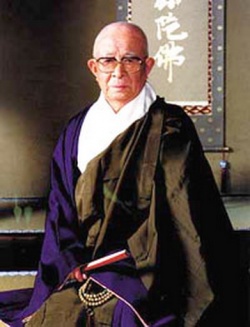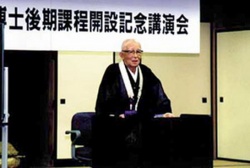Prayers to Amida Buddha, "Nembutsu", Serve as Our Anchor in Life by Hossu Tsuboi Shunei (Chief Priest of Main Temple Konkai-Komyo-ji in Kyoto)
Honen Shonin, the Japanese founder of Jodo Shu, was the first to advocate the following: "Make it a rule to call on Amida Buddha by reciting the nembutsu. You will then be able to be born in the Pure Land after your death and become spiritually awakened."
Honen Shonin entered the priesthood when he was thirteen years old at the leading Buddhist temple of the time, Enryaku-ji, located on Mt. Hiei-zan near Kyoto. The temple belongs to the Tendai sect, known as T'ien-t'ai in Chinese. Here, Honen learned the teachings of the Buddha for about thirty years until he was forty-three years old. At a certain point, Honen understood that suffering comes from worldly attachment when a person clings to things and is selfish (this is called gayoku-gashu ).
Yet he recognized that he was still immature because he was not able to overcome this worldly attachment. Honen felt, though, that Amida Buddha will value and emancipate such an immature person as himself. In this way, Honen finally understood the teachings of Amida Buddha, Amida Buddha's Original Vow, and the nembutsu of calling on Amida Buddha.
For Honen, gayoku-gashu equals selfishness. Someone who is selfish will injure others, will try to dominate others, will never reflect on what he or she has done, and will pursue profit and pleasure.
In private life, someone who is selfish will cause domestic troubles. In society, whether under socialism or democracy, someone who is selfish will try to dominate the nations of other races to keep the peace and happiness of his or her own race.
In this world that is infested with gayoku-gashu, people are not able to keep peace in their families nor amongst nations.
The Buddha taught people who were imprisoned by gayoku-gashu about dependent co-origination, selflessness, and voidness in order to overcome this worldly attachment. However, this is not an easy task to achieve.
Honen also recognized that most people are imprisoned by gayoku-gashu. He stated that he also was not able to easily overcome this worldly attachment and that he tended to have desires and be selfish. In this way, Honen Shonin referred to himself as an "ignorant, deluded person" (bonpu). Honen's emphasis on this point is expressed as follows:
You must confirm whether you have attachment or not and should not permit any selfish act. You must recognize that you always tend to have attachment and to be selfish. You must learn to control yourself."
Honen Shonin called this type of person "an ignorant, deluded person" (bonpu). Amida Buddha, however, made the following vow:
I will value and emancipate with compassion such ignorant, deluded persons, who call on me as "Namu Amida Butsu".
The "one was destined to become Amida Buddha" practiced for many long years in order to keep this vow and was called "Hozo-bosatsu (Bodhisattva)", not "Amida Buddha". This one determined that "unless I can keep the promise, I will not become Amida Buddha." Finally, after arduous practice, the one became Amida Buddha.
The sutras state that this happened a very long time ago. Amida Buddha promises that you can be born in the Pure Land after your death by making it a rule to recite the nembutsu.
After many years of practice on Mt. Hiei, Honen realized that Amida Buddha always vows to be compassionate to people. At this point, Honen left Mt. Hiei and established Jodo Shu. He advocated that everybody can be born in the Pure Land by reciting the nembutsu.
You can call on Amida Buddha by simply reciting the nembutsu, "Namu Amida Butsu." "Namu Amida Butsu" means "Amida Buddha! May my emancipation be realized!" Amida Buddha identifies people who recite "Namu Amida Butsu," look and listens to them, and then keeps the presence of those people in his mind. (This is referred to as "intimate relations" or "terms") Finally, Amida Buddha appears in front of the people (this is referred to as "close terms.") Even though Amida Buddha may be invisible, Amida Buddha tries to give more assistance to such people. Such people will be able to reach the goal of returning to the Pure Land after their death.
Honen stated that as long as you lead a "such a life," you will never be imprisoned by any worldly attachments. This life advocated by Honen means a life in which you can co-exist with the Buddha and can rely on the Buddha for help.
Thus, Honen Shonin advocated the teaching of the nembutsu and instructed the people to realize "such an easy life."

